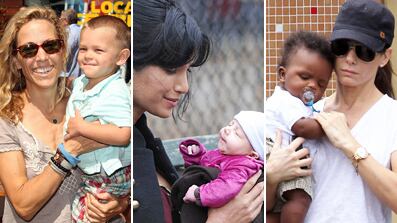Men are eternally baffled by what women want, it seems. Sigmund Freud despaired of figuring out what he called “the great question that has never been answered.” Other men don’t even try; when Roger Sterling, the advertising mogul in the 1960s-era television series Mad Men, was asked what women want, he sneered: “Who cares?”
Gallery: Celebrity Single Moms

They’re not exactly fast learners, are they? Male cluelessness hit another high-water mark this month when Bill O’Reilly enlivened the dog days of summer by attacking Jennifer Aniston. Her ostensible crime was defending single women who use sperm donors to conceive their babies, the choice made by the character she plays in the romantic comedy The Switch. When Aniston commented that women today “don’t have to settle with a man just to have a child,” O’Reilly accused her of “diminishing the role of the dad” in a way that’s “destructive to society.”
The ensuing flap was a virtual replay of the one that erupted nearly two decades ago when Dan Quayle denounced the television anchorwoman played by Candace Bergen on the TV series Murphy Brown. That character got pregnant the old-fashioned way, but when she chose to have the baby on her own, Quayle charged that she was “ignoring the importance of fathers by birthing a child alone.” He was running for vice president at the time, but even allowing for the usual shameless pandering of a political campaign, his comments made little sense; as an antiabortion Republican, would he have preferred that the character terminate her pregnancy instead?
At least these guys are consistent; few topics inflame the hostility of conservative men more reliably than unmarried women having babies, an everyday occurrence they seem to experience as a personal affront. But why do such self-appointed male guardians of public morality always cast women as the villains of their family-values fearmongering?
When Aniston spoke about the character she plays in her new movie, everyone knew she was also thinking about her own personal situation. Instead of trashing her, why didn’t O’Reilly express sympathy for the heartbreak she endured when she was preparing to start a family just as her husband was preparing to run off with Angelina Jolie? Since Aniston’s divorce, she has repeatedly said that she’d like to have a baby with the right guy, but such commitment-averse boyfriends as John Mayer have failed to provide a stable partnership for such an adult undertaking. It’s hardly surprising that Aniston, at 41, might now consider raising a child on her own, as her friend Sheryl Crow did after getting engaged to Lance Armstrong and then discovering that he had changed his mind about having a child before her biological clock ran down.
Other high-profile women also became single mothers after disillusioning experiences with men. Sandra Bullock had just adopted a baby when she learned that her husband was a compulsive philanderer and ended their marriage. Actress Mary-Louise Parker was seven months pregnant when Billy Crudup, her partner of many years, ran off with Claire Danes. When model Elizabeth Hurley got pregnant by billionaire Steve Bing, he denied paternity and took her to court, although DNA tests later proved he was indeed the father of their child. Diane Keaton spent years trying to find the right parenting partner before adopting two children during her fifties, much later than she would otherwise have become a mother. “I wanted to be in a good relationship,” she explained. “Those good relationships that are strong and substantive never happened for me.”
Nor is a marriage license any guarantee that a man will spend his free time at home being a good dad; just ask Elin Nordegren, or Jenny Sanford, or Elizabeth Edwards. And don’t forget Mel Gibson’s ex-wife, the mother of his first six children, or the Russian girlfriend he left his wife for and fathered a baby with, only to threaten her life, beat her up, and leave her to raise their child alone.
The pro-marriage lobby is always excoriating single mothers, citing the usual litany of risks faced by their children. But most of those risks are the consequence of poverty, and it’s preposterous to apply them to the much-wanted children of wealthy women.
Which brings us back to the question of why men like O’Reilly are so threatened when women like Aniston—who ranks among the highest-earning females on the planet—support the idea that women can decide for themselves when and how to become mothers. It’s always seemed strange that the life choices of fictional characters arouse such exaggerated ire from right-wing ideologues; could it be that those imaginary targets merely give plausible cover to men whose real grievance is with the powerful women who play them?
Conservatives really seem to hate it when uppity women—damn that pesky economic empowerment!—make their own choices like that.
Very few females grow up dreaming about the glamour and excitement of unwed motherhood.
Even more bizarre is the fact that nowhere in all this criticism of women, both real and fictional, do you hear much discussion of men’s role in creating fatherless children. Why did Quayle attack Murphy Brown instead of the boyfriend who helped to make their baby and then forced her to raise the child on her own because he was unwilling to give up his freedom to become a responsible parent? Do conservative demagogues really believe that women would rather raise kids alone than with a loving, dependable partner?
Well, here’s a news flash for men who still don’t have any idea what women want: Very few females grow up dreaming about the glamour and excitement of unwed motherhood. Raised on a steady diet of romantic fairy tales, from the Disney videos of their preschool years to the chick lit and chick flicks they consume so voraciously in adolescence, American girls are profoundly influenced by the fantasy that Prince Charming will marry them and they’ll happily ever after.
The problem is that it isn’t true. Virtual empires are inspired by men’s inability to commit to marriage and monogamy, the underlying theme of the entire Sex and the City franchise. Millions of men routinely have sex without bothering to use birth control, and once a baby arrives they abdicate on their financial as well as their parental obligations. Just ask the baby-mamas impregnated by all the young men who father children with multiple different women while neglecting to marry any of them; more than 70 percent of African-American children are born to unwed mothers.
As for women who do wed, nearly half of them end up divorced, while those who stay married discover that husbands cheat on wives at far higher rates than wives do on husbands. After divorce, 80 percent of custodial parents are women, and 70 percent of these single mothers don’t get the amount of child support they’re owed. When marriages fail, the deadbeat dad is the norm in American society, not the exception.
The idea that women seek commitment while men avoid it may be a cliché, but the stereotype contains a good deal of truth; many of women’s fondest dreams still revolve around marriage and motherhood—the whole package, not either/or. The evidence suggests that it’s often men who won’t get with the program, and yet it’s the women who are demonized for the ways they struggle to cope with male default.
So when men don’t live up to their end of the bargain, let’s stop blaming the victims. The issue of children’s welfare is far too important to be sacrificed to the intellectually dishonest formulas that have characterized the culture wars for so long. Instead of vilifying women, it would be a lot more productive to start demanding that men grow up and behave responsibly with their female partners—not to mention their own children.
Leslie Bennetts, a former New York Times reporter, is the author of The Feminine Mistake.






